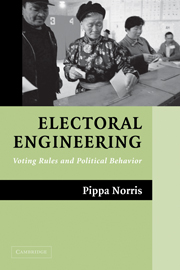Book contents
- Frontmatter
- Contents
- List of Tables and Figures
- Preface
- Electoral Engineering
- PART I INTRODUCTION
- 1 Do Rules Matter? Structure versus Culture
- 2 Classifying Electoral Systems
- 3 Evaluating Electoral Systems
- PART II THE CONSEQUENCES FOR VOTING BEHAVIOR
- PART III THE CONSEQUENCES FOR POLITICAL REPRESENTATION
- PART IV CONCLUSIONS
- Bibliography
- Notes
- Index
3 - Evaluating Electoral Systems
Published online by Cambridge University Press: 05 September 2012
- Frontmatter
- Contents
- List of Tables and Figures
- Preface
- Electoral Engineering
- PART I INTRODUCTION
- 1 Do Rules Matter? Structure versus Culture
- 2 Classifying Electoral Systems
- 3 Evaluating Electoral Systems
- PART II THE CONSEQUENCES FOR VOTING BEHAVIOR
- PART III THE CONSEQUENCES FOR POLITICAL REPRESENTATION
- PART IV CONCLUSIONS
- Bibliography
- Notes
- Index
Summary
In recent decades, debate about electoral engineering has moved from margin to mainstream on the policy agenda in many nations. Political discussions about electoral reform have revolved largely around the practical options, the sometimes bewildering combination of trade-off choices, and the consequences of particular reforms to the status quo within each state. Underlying these pragmatic arguments are contested normative visions about the basic principles of representative government. The most fundamental debate raises questions about the ultimate ends as well as means of elections. The general consensus in the literature emphasizes that no “perfect” bespoke electoral system fits every society. Instead, arrangements have to be tailored to different contexts, and choices require trade-offs among competing public goods. The most common argument today revolves around the pros and cons claimed for majoritarian, combined, and proportional types of electoral systems, for example, which is best for maximizing electoral participation or for containing ethnic conflict. Major questions underlying these empirical claims concern what forms of representative democracy are more desirable, and what functions electoral systems should perform. Some studies of electoral systems fail to deal explicitly with the normative assumptions, preferring to focus exclusively upon the factual claims. Others present lengthy shopping lists of the alternative values that electoral systems are supposed to meet, emphasizing the desirability of, say, the inclusion of women, the management of ethnic conflict, or the importance of governability, agnostically letting readers pick and choose whatever values they regard as most important.
- Type
- Chapter
- Information
- Electoral EngineeringVoting Rules and Political Behavior, pp. 66 - 78Publisher: Cambridge University PressPrint publication year: 2004
- 1
- Cited by

